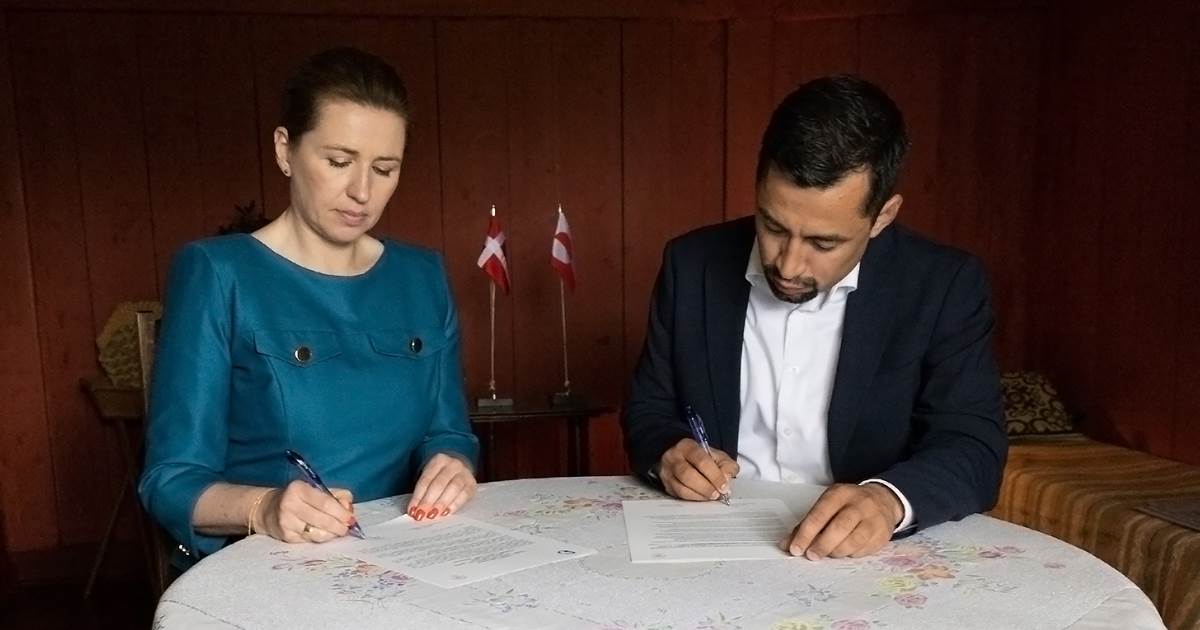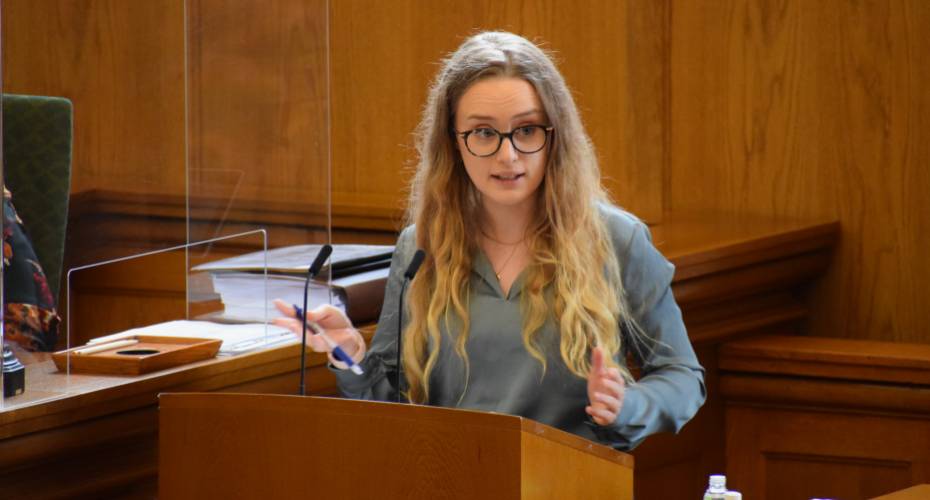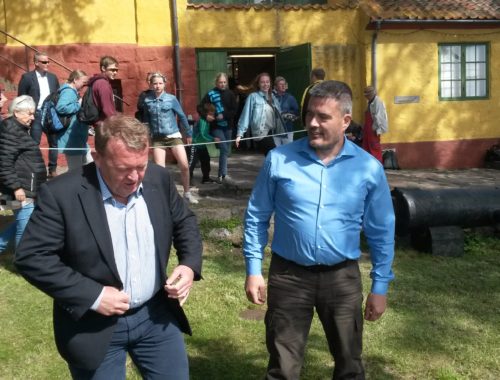The largest ever probe into possible historical Danish wrongdoings in Greenland is about to begin
oktober 6, 2022 • Af Martin BreumThe largest ever investigation into possible abuses in Greenland by the former Danish colonial powers or more recent Danish governments is about to begin.
In June this year, the head of Naalakkersuisut, Greenland’s government, Múte B. Egede and Prime Minister Mette Frederiksen of Denmark, from where I write, agreed on a joint effort to investigate all major relevant incidents in the seven decades since the second world war.

Mette Frederiksen and Muté B. Egede signining in June their agreement to begin a joint investigation. Photo: The Primeministers office
Their joint statement received surprisingly little public attention, but it revealed an astonishing ambition:
“The investigation will cover the period from the second world war until today. The investigation will focus on the most important political decision, events and other circumstances that shaped the development of Greenland and its population as well as the relation between the two countries,” it said.
At no time in the past has any Danish government shown willingness to partake in such a wide-reaching and deep-probing exercise.
The statement by the two leaders was kept deliberately short and vague, leaving room for the civil servants to design in detail the more precise and potentially controversial mandate for the investigation. It is due later this month; the decisive proportions of the probe, its format, financing and duration is being hammered out as I write this.
Political will
Meanwhile, there is no reason to doubt the political will of the two political leaders behind the investigation.
In Greenland, anger over an extensive series of historical incidents — as well as more recent ones — and what might possibly amount to systematic violations of basic rights of Greenlanders has been brewing for generations and Egede added a separate statement to the joint communique: “During later years we have witnessed how one sad story has been revealed after the other. Stories that have carried with them great personal costs to the individuals involved. All of the people of Greenland stand behind the demand that a historical investigation be carried out,” he said.
In Denmark, Frederiksen has been contemplating a deeper probe for several years. After her first visit to Greenland in 2015, she told me that “it is quite a lot easier to establish a cooperation between Denmark and Greenland, if both parties acknowledge that mistakes have been made through time. You cannot spend many hours in Greenland before you realize that history and also its darker sides play a large role for many there.”
In June she was quoted in the formal press release as follows: “We have recently become aware of cases and processes that bear witness that there are still chapters of our common history that we have not yet uncovered. I am happy that we have made this joint decision about a historical investigation for the benefit of our two countries and for reconciliation with our common past.”
The upcoming probe must be understood in this light. The Danish prime minister most likely finds the entire exercise essential for future cooperation with Greenland. By acting on her conviction that a common approach to the past, including its troublesome sides, is necessary if reconciliation is to be achieved, she aims to restore Greenland’s faith in cooperation with Denmark at a time when Greenland and the Arctic is becoming still more important to Denmark.
No thanks
A few isolated events have been investigated on earlier occasions, reported on and even officially apologized for by shifting Danish governments, but we have not seen more encompassing investigations like that of Canada’s Truth and Reconciliation Commission or that of the ongoing investigations in Sweden, Norway and Finland. In those countries long-standing and possibly discriminatory practices against Sámi and other ethnic minorities are being scrutinized by other truth and reconciliation bodies.
Some will find that a thorough probe in the Danish kingdom is long overdue. The first Danish-Norwegian missionaries settled in Greenland in 1721 and Greenland was a de facto Danish colony from then on. From 1953, Greenland became an integral part of Denmark; Greenlanders are Danish citizens. Phenomenal changes, often spearheaded by Denmark, has taken place in Greenland since, so it is no surprise that the upcoming investigation will be pinned to this particular period of time.

Aki-Mathilda Høegh-Dam, Greenlandic member of the Danish parliament, talked of “genocide” when the latest scandal was unearthed. Photo: Siumut
In many respects, Greenland is an autonomous nation, ruled and regulated by Naalakkersuisut, the government in Nuuk, but the island and its people are is still part of the Danish Kingdom and subjects to the Danish constitution.
A separate Greenlandic Reconciliation Commission worked in Greenland from 2014-2017, but with limited impact. The then-head of Greenland’s government Aleqa Hammond often argued openly with the political establishment in Denmark (and she also caused controversy in Greenland).
When asked about potential Danish involvement in the reconciliatory commission proposed by Hammond, Denmark’s prime minister at the time, Helle Thorning-Schmidt, offered only an icy no thanks: “We don’t have a need for reconciliation,” she quipped.
The Greenlandic commission remained a local initiative and it only indirectly probed the events and processes that are often talked about in Greenland as systemic abuses caused by Danes or Denmark’s colonization of Greenland. Eyewitnesses and other people in Greenland were heard, recommendations written, but the Greenlandic commission suffered from a frequent exchange of personnel and shifting levels of political support from the political leaders in Nuuk.
Latest scandal
News of the upcoming joint investigation coincided with widespread consternation in Greenland over the latest scandal.
A Greenland women’s magazine Arnanut did the first interviews with women involved and in May this year the Danish Broadcasting Corporation revealed how, from 1966 to 1975, some 4,000 women — about half of the fertile women in Greenland —had an intrauterine contraceptive device or coil inserted as part of a campaign by the Danish health authorities.
Many of those affected were only 15-16 years old, and many did not understand what happened to them. Some of those interviewed told of horrific pains that lasted for years. Long-forgotten documents revealed that the health authorities in Copenhagen at the time were eager to halt the rapid population growth in Greenland, the rising number of single mothers and an accompanying hike in public expenditure.
As the details of the campaign were unraveled, one of the two Greenlandic members of the Danish parliament, Aki-Mathilda Høegh-Dam, dubbed the campaign ”genocide,” and when I visited Nuuk a few weeks ago with members of the Danish Foreign Policy Society, we were told how others in Greenland shared her indignation:
“My initial reaction was that ‘genocide’ was probably an exaggeration, but as the scope of the scandal has become clear it is actually not wrong. Thousands of Greenlandic lives were never born. Very young girls and women were forced to not have children or did not understand the implications,” said Asii Narup Chemnitz, one of Greenland’s most experienced politicians, a former mayor of Nuuk and now a member of Inatsisartut, Greenland’s parliament, for the governing Inuit Ataqatigiit party.
A deputy chairperson of the Siumut party, Inga Dora Markussen, who has teen-age daughters of her own, told us she wept as she learned of the campaign.
”The state has no right whatsoever to violate anybody’s virginity. This deed can never be justified — never,” she wrote on Facebook, demanding ”an unreserved apology from the Danish state” and ”tangible compensation.”
Equal numbers
In writing about the upcoming joint investigation, Inge Høst Seiding, head of the Institute of Language, Culture and History at the University of Greenland, argued that equal numbers of Greenlandic and Danish researchers should be involved. If not enough are available in Greenland, they should be educated as part of the investigative exercise, she argued. She also recommended that ordinary citizens be heard and engaged, youth included. In Greenland, the experts talk of intergenerational trauma or psychological wounds that are passed from the victims of abuse to their children or even grandchildren.

“Memories are carried by living people, but also by their descendants as recollections of unwanted relocations from hamlets to towns, adoptions out of the country, divided families, segregation by language and the feeling of not moving forward in life in your own country,” Seiding wrote in an op-ed for Altinget, a Danish news outlet.
No pope expected
Few if any observers expect that the upcoming Danish-Greenlandic investigation will uncover hitherto unknown assaults on the lives and physical integrity of men, women and children in Greenland to the extent now known from the Canadian north through Canada’s Truth and Reconciliation Commission.
As previously reported, even Pope Francis found it necessary to react to the findings in Canada, begging as he did during a recent visit of penance “forgiveness for the evil committed by so many Christians against the Indigenous peoples.” The Pope was speaking in particular of the many residential schools that were homes to tens of thousands of Indigenous Canadian children forcibly removed from their communities as Canada’s government — and the Catholic Church — tried to rid them of traits of their origins. Many suffered physical and sexual abuse.

There is no indication of crimes of this magnitude in Greenland, but the catalog of what is often interpreted as Danish abuse is impressive. Examples include: the forced relocation of those who lived close to Thule Air Base in 1953; the closure of dozens of small settlements in Greenland in the 1950s and 1960s; the absence of a referendum in Greenland in 1952, as Greenland changed from colony to integral part of Denmark; the lack of subsequent equality between Danes and Greenlanders; the closure of Qullissat, a mining town, in 1972; the “birthplace-criteria” that gave, until 1989, Danes in Greenland much higher salaries than their local colleagues; the segregation of all school children in Danish- and Greenlandic-speaking classes; the so-called “experiment children” who in the 1960s were sent on extended stays in Denmark in order for them to become more Danish; the “legally fatherless,” who were not entitled to inherit from their Danish fathers when the fathers abandoned them and repatriated to Denmark; the many children adopted by visiting Danish families and the discrimination of Greenlanders in Denmark — just to name a few.
To get a better idea of the challenges the upcoming investigation will face I called on Astrid Nonbo Andersen, a historian of ideas at the Danish Institute of International Studies and one of Denmark’s leading researchers of truth and reconciliation processes:
“This will be a very, very large exercise. An investigation into all major incidents through seven decades. Think about it for a moment,” she said.
She expects that a least a handful of academic researchers will be roaming archives in Greenland and Denmark for at least five years: “Parts of the archives are not in a very good condition, so one has to dig carefully,” she says.
She also assumes that hearings of eyewitnesses still alive in Denmark and Greenland will be necessary: “What happened to the Greenlanders over time was not necessarily put in writing. It may be something that was felt and talked about in Greenland, but not automatically experiences that were written down,” she said.
Reconciliation how?
There will be particular focus on how the investigation will pursue actual reconciliation.
“Reconciliation with our common past” was highlighted as a goal in the June statement from Greenland and Denmark’s political leaders, and — as Andersen explained to me — the mere provision of facts and figures is not likely to do the job:
“The ‘coil campaign’ is a good example,” she said.
“It is good that the campaign is now out in the open, but in the first instance this has only led to more bitterness and anger in Greenland. It has not brought any immediate relief to the relation between Denmark and Greenland. Reconciliation is all about how you handle such cases,” she told me.
Previous Danish investigations of wrongdoings by the authorities have been based, she finds, on a belief that facts will bring reconciliation by themselves, but reconciliation is not that easy.
To those subjected to abuse, giving evidence of the abuse may cause re-traumatization, just as new Greenlandic accusations against Denmark, Danish institutions or individuals will likely cause indignation and anger in Denmark.
In the end, we should perhaps expect not too many indisputable truths. In Canada for example, the government and communities in the North maintain that the apologies of Pope Francis did not cover all abuses committed by the Catholic church.
As Andersen told me: “Any historian will know that the final word is never said. There will always be new discoveries, new interpretations and explanations. We have to recognize just how long-term any reconciliation is likely to be.”
This text was first published on ArcticToday.com October 5th 2022. Shortly after, a general election was called in Denmark. This might delay the mandate of the joint investigation mentioned in the text.
